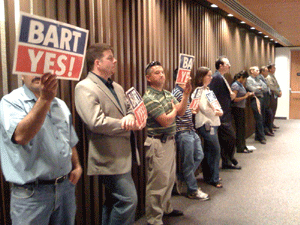Voters will decide on a one-eighth-cent sales tax measure on the
November ballot to fund BART in the South Bay.
Voters will decide on a one-eighth-cent sales tax measure on the November ballot to fund BART in the South Bay.
The Santa Clara Valley Transportation Authority Board of Directors voted 9-3 Thursday night to place the measure on the ballot. The sales tax would bring in $42 million a year – or $1.3 billion over the 30-year life of the tax – to pay for maintenance and operation of the train once it is extended from Fremont to San Jose. The tax would only be collected if the authority could come up with matching funds from the Federal Transit Administration, and it needs a two-thirds majority to pass.
It is estimated the 16.1-mile extension will cost $6 billion.
VTA board member Don Gage, a former Gilroy mayor and current Santa Clara County Supervisor, voted against putting the measure on the ballot.
Gage said he voted against the tax because he’d like the focus to be on the $840 million Valley Medical Center measure that would be used to bring the hospital into compliance with safety laws and replace closed facilities in San Jose.
“The only other (tax) I’m supporting is the (Gilroy) school bond measure,” Gage said, referring to the $150-million bond that voters will also decide on in November. “People are just getting taxed to death. With gas, food costs, property values going down – it goes on and on, people are really suffering out there. It’s a situation where something’s got to give here.”
Morgan Hill City Councilman and fellow board member Greg Sellers voted for the tax measure.
“Nobody likes paying taxes, but everyone likes services that work,” Sellers said. “This (tax) will go to a very specific purpose and a goal that’s sustainable.”
The one-eighth-cent sales tax increase translates to about $37.50 of tax on a $30,000 car. The county’s current sales tax is 8.25 percent. Several county residents spoke during the two-hour meeting about the pros and cons of bringing the rapid rail line to San Jose.
Carl Guardino, president and CEO of the Silicon Valley Leadership Group, who’s been lobbying in favor of bringing BART to San Jose for several years, said in an e-mail to South Valley Newspapers: “Caltrain and BART riders will benefit from a regional rail system with a seamless platform-to-platform transfer, and the future People Mover linking Caltrain and BART to all three terminals at San Jose International Airport. At a time when we are fighting $4-per-gallon gasoline and are concerned about our nation’s over-dependence on foreign oil, expanding BART and linking with Caltrain are part of a comprehensive, regional solution.”
But some opponents claim the system is outdated.
“The BART is already 40 years old,” said Noel Tebo, of the Modern Transit Society. “What Santa Clara needs is a modern system.”
Tebo pointed to Vancouver and London’s automated systems as examples of mass transit for the new millennium.
But, proponents like VTA board member Forrest Williams said the technology is sound and verified.
“It’s electrified rail and an electrified motor,” Williams said. “What, are we going to wait for new electrons to be discovered?”
Fellow board member and San Jose Mayor Chuck Reed pointed out that the BART project drove the 70 percent approval of 2000’s Measure A, which enacted a half-cent sales tax to make mass transit improvements that included connecting BART to the county.
Board member and extension opponent Yoriko Kishimoto said, “We have done the financial analysis, and we know that even one-fourth of a cent is not enough. I don’t like us shortcutting. We’ve done a relatively poor job of presenting true information and choices.”
Kishimoto said the $48 million the VTA has spent in engineering work and buying land for the project is just a drop in the bucket to the total costs.
“There’s 94 percent yet to be spent,” she said. “There’s still time to confirm numbers, and finish the analysis on Measure A.”
In Gilroy, the BART sales tax increase and Gilroy’s school bond measures will share the ballot with a $37 million library bond.
Morgan Hill voters will choose whether or not to approve a 2 percent utility users’ tax to pay for more police officers.
Regionally, voters will consider a $9.9 billion bond measure to fund a California High Speed Rail Authority project that would link the state’s major cities and regions, providing travel from San Francisco to Los Angeles in two and a half hours on the so-called “bullet train.”













